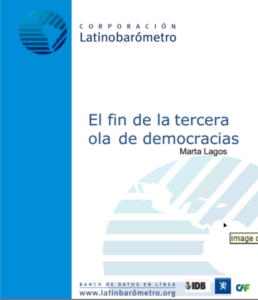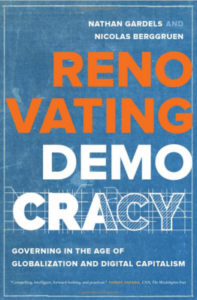
Latinobarometro
It was one of the greatest waves of democratization ever. In 1977 all but three of the 20 countries in Latin America were dictatorships of one kind or another. By 1990 only Mexico’s civilian one-party state and communist Cuba survived. But the outlook is now much bleaker, The Economist observes:
Yet there are some grounds for optimism. Latin American democracy is more resilient than outward appearances might suggest. Opinion polls suggest that only around a fifth to a quarter of Latin Americans might welcome authoritarian government. In some countries checks and balances provide safeguards. In Brazil, for example, Mr Bolsonaro’s government is a ramshackle assortment of generals, economic liberals and social conservatives.
“Bolsonaro isn’t a party, he isn’t anything, he’s a momentary mood,” says Fernando Henrique Cardoso, a sociologist and former Brazilian president, who trusts in the countervailing strength of the legislature, a free media and social organisations. “You have to be forever vigilant but I don’t think the institutions here are going to embark on an authoritarian line.”
 While concern about a retreat from democracy is a global phenomenon, Latin America’s youthful institutions could be especially at risk — if voters decide that politicians from all points on the spectrum are equally incapable of turning things around, Bloomberg adds:
While concern about a retreat from democracy is a global phenomenon, Latin America’s youthful institutions could be especially at risk — if voters decide that politicians from all points on the spectrum are equally incapable of turning things around, Bloomberg adds:
A study by Latinobarometro found that support for democracy is in long-term retreat in all three countries. It fell to 34 percent in Brazil last year, from 48 percent two decades earlier. There were similar-sized declines in Argentina (from a higher starting point) and Mexico.
The Latin American economic cycle’s current phase coincides with the end of a commodities boom that killed the dreams of a nascent middle class, according to Christopher Sabatini at Columbia University.
 “What you’re looking at is an incapacity to address these harder issues,’’ said Sabatini (a former National Endowment for Democracy staffer). Over time, it may “decrease people’s belief in the democratic system.’’
“What you’re looking at is an incapacity to address these harder issues,’’ said Sabatini (a former National Endowment for Democracy staffer). Over time, it may “decrease people’s belief in the democratic system.’’
 Amid the dust from the collapse of old party systems, there are glimpses of democratic renewal, led by a new generation of activists, The Economist adds:
Amid the dust from the collapse of old party systems, there are glimpses of democratic renewal, led by a new generation of activists, The Economist adds:
There’s “an ecosystem of new politics in Brazil,” explains Eduardo Mufarej, an investment banker who has set up Renova, a privately funded foundation to train young democratic leaders in politics, ethics and policy. In the 2018 elections, 120 of Renova’s graduates ran (for 22 different parties). Ten were elected to the federal Congress and seven to state legislatures.







